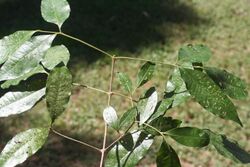Biology:Bouchardatia neurococca
| Union nut | |
|---|---|

| |
| Near Mount Mellum | |
| Scientific classification | |
| Kingdom: | Plantae |
| Clade: | Tracheophytes |
| Clade: | Angiosperms |
| Clade: | Eudicots |
| Clade: | Rosids |
| Order: | Sapindales |
| Family: | Rutaceae |
| Genus: | Bouchardatia |
| Species: | B. neurococca
|
| Binomial name | |
| Bouchardatia neurococca (F.Muell.) Baill.[1]
| |
| Synonyms[1] | |
| |
Bouchardatia neurococca, commonly known as union nut,[2] is a species of small rainforest tree that is endemic to eastern Australia. It has pinnate leaves with three or five narrow elliptical leaflets, white flowers arranged in panicles, and oval follicles.
Description
Bouchardatia neurococca is a tree that typically grows to a height of 8 m (26 ft) and has smooth greyish brown to dark brown bark. The leaves are arranged in opposite pairs and pinnate with three or five narrow elliptical to lance-shaped leaves with the narrow end towards the base. The leaves are 100–200 mm (3.9–7.9 in) long on a petiole 20–50 mm (0.79–1.97 in) long, the leaflets 55–130 mm (2.2–5.1 in) long and 10–50 mm (0.39–1.97 in) wide. The upper surface of the leaves is glossy dark green, the lower surface yellowish green and there are small, hairy domatia. The flowers are arranged in panicles 50–100 mm (2.0–3.9 in) long, on the ends of branchlets or in leaf axils, with four sepals 0.8–1.5 mm (0.031–0.059 in) long, four white petals 4–5 mm (0.16–0.20 in) long and eight stamens that alternate in length. The fruit is an ovoid follicle 8–10 mm (0.31–0.39 in) long.[2][3][4]
Taxonomy
The union nut was first formally described in 1858 by Ferdinand von Mueller who gave it the name Euodia neurococca and published the description in Fragmenta phytographiae Australiae.[5][6] In 1870, Henri Ernest Baillon changed the name to Bouchardatia neurococca in the journal Adansonia.[7][8]
Distribution and habitat
Bouchardatia neurococca grows in subtropical and dry rainforest from near sea level to an altitude of 730 m (2,400 ft) and from Mackay in central-eastern Queensland to the Richmond River in north-eastern New South Wales.[2][3]
References
- ↑ 1.0 1.1 "Bouchardatia neurococca". Australian Plant Census. https://biodiversity.org.au/nsl/services/apc-format/display/63324. Retrieved 8 July 2020.
- ↑ 2.0 2.1 2.2 Hartley, Thomas G. (2013). Flora of Australia (Volume 26). Canberra: Australian Biological Resources Study. pp. 52–54. https://profiles.ala.org.au/opus/foa/profile/Bouchardatia%20neurococca. Retrieved 8 July 2020.
- ↑ 3.0 3.1 "Bouchardatia neurococca". Centre for Australian National Biodiversity Research (CANBR), Australian Government. 2020. https://apps.lucidcentral.org/rainforest/text/entities/Bouchardatia_neurococca.htm.
- ↑ Richards, P.G.. "Bouchardatia neurococca". Royal Botanic Garden Sydney. http://plantnet.rbgsyd.nsw.gov.au/cgi-bin/NSWfl.pl?page=nswfl&lvl=sp&name=Bouchardatia~neurococca. Retrieved 8 July 2020.
- ↑ "Euodia neurococca". APNI. https://id.biodiversity.org.au/instance/apni/477923. Retrieved 8 July 2020.
- ↑ von Mueller, Ferdinand (1858). Fragmenta phytographiae Australiae. Melbourne: Victorian Government Printer. p. 28. https://www.biodiversitylibrary.org/item/7218#page/30/mode/1up. Retrieved 8 July 2020.
- ↑ "Bouchardatia neurococca". APNI. https://id.biodiversity.org.au/instance/apni/469285. Retrieved 8 July 2020.
- ↑ Baillon, Henri Ernest (1870). "Sur les graines du Bouchardatia". Adansonia 9: 110. https://www.biodiversitylibrary.org/item/25867#page/120/mode/1up. Retrieved 8 July 2020.
Wikidata ☰ Q15389629 entry
 |

